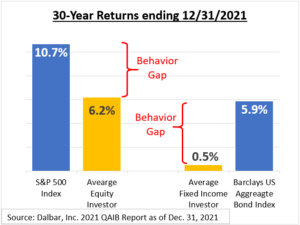Many may not realize it, but we are our own worst enemy. Our brains, its chemistry and its reactions were developed over eons to escape dangerous situations. This was important in prehistoric days when there was a rustling in the bushes. Could it be the wind, a chipmunk or a tiger? Contemplating the possibilities could have meant death.
Modern financial markets are about 150 years old. Hardly time for our brains to evolve from being emotionally charge units, yet the same chemical interaction influences our high-level decisions. Our brains evolved into emotional mechanisms which can deceive us in today’s modern world.
Research done by Dalbar, Inc., a company that studies investor behavior and analyzes investor market returns, consistently shows that the average investor earns below-average returns. For the 30 years ending December 31, 2020, the S&P 500 Index averaged 10.7% a year. The average equity fund investor earned a market return of only 6.2%.1
Dalbar, Inc. and other academics found investor behavior is illogical and often emotionally based. This does not lead to wise long-term investing decisions. Some of the more common mistakes are
- Buying High (usually AFTER a market/stock advance),
- Overreacting During Times of Uncertainty (things are rarely as bad as they seem),
- Overconfidence (investors exaggerate their ability to predict the future).
The intersection of psychology and investing has developed into a field of study often referred to as Behavioral Finance. We may not be able to fully overcome our innate tendencies, however being aware of them and their triggers should help mitigate poor decisions. For example, media (financial media and general media) is purposefully designed to keep people emotionally charged. Sensationalized negativity keeps anxiety front and center. The purpose is to keep individuals tuned into a given station or subscribed to a periodical.
Here are three key takeaways to avoid being an average investor.
- Temper your enthusiasm during good times.
- Become more optimistic when things look bad.
- Be aware of external stimuli offering jaded perspectives.
- Stick to your plan.
Vanguard has developed a white paper series titled Advisor’s Alpha2. Advisor’s Alpha presents research and evidence of our emotional proclivities and ways to overcome them. Additionally, Vanguard reviews tactics employed by financial advisors to better your probability of success and reduce being your own worst enemy. It’s an enlightening read as you relax on the beach, poolside or at home. Enjoy the weekend and time with the family.
1 https://www.dalbar.com/ 2 Advisor’s Alpha | Vanguard Advisors
CRN-3680226-072021


Recent Comments